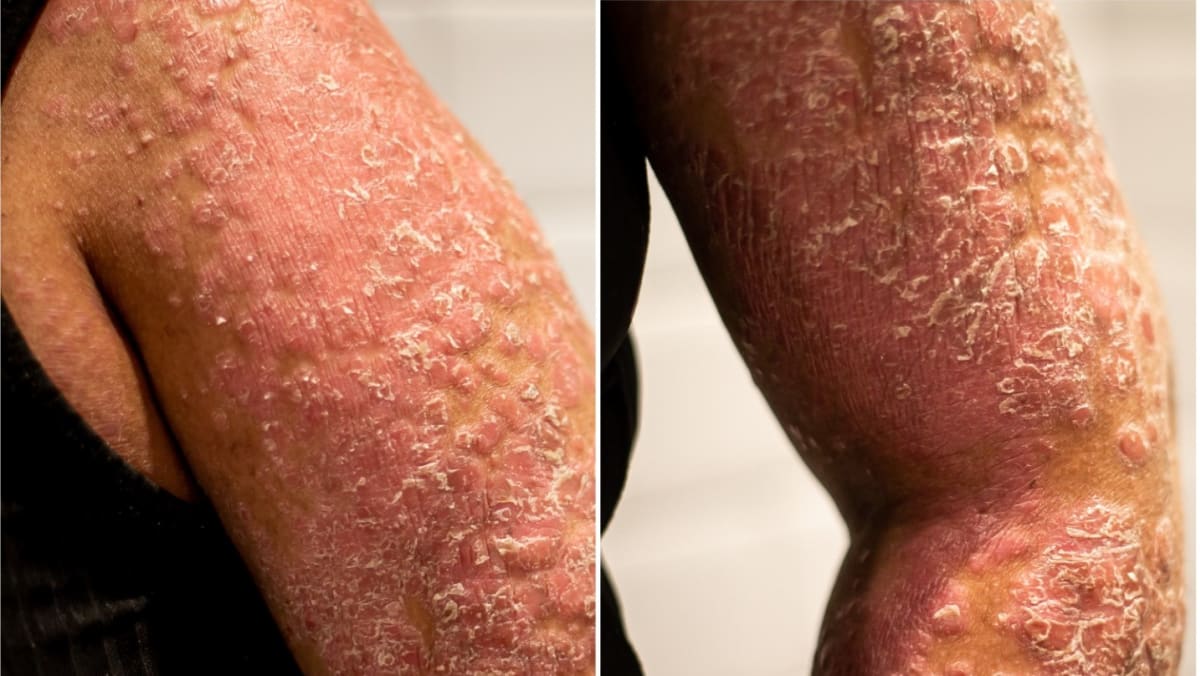SINGAPORE — When angry-looking red patches of skin first appeared on Ms Mei Yetti Roslan’s scalp and skin, her neighbours told her that she was “cursed”.
An International Federation of Psoriasis Associations’ ambassador from the Philippines, Ms Casanova highlighted the need to raise awareness of GPP and provide avenues for patients to “voice their pain”.
The federation is a global non-profit organisation made up of national and regional psoriasis patient associations around the world.
“When we have a flare-up, we can’t do anything by ourselves — not even going to the toilet,” Ms Casanova said, having experienced a recent flare-up herself.
To show TODAY the highly visible skin symptoms that can go on for weeks or months after a flare-up, Ms Casanova removed her jacket, revealing widespread painful lesions on her arms.
“Living with GPP is a psychological, social and emotional torture. Patients not only endure the excruciating pain from a flare-up, but we also tend to withdraw from society to avoid being discriminated against,” she said.
Ms Mei said that the pus-filled lesions that occur are sometimes accompanied by a “bad smell”, much “like rotten fish”.
GPP pustules contain pus, a white or yellow fluid filled with white blood cells.
Dr Theng explained that there may be an odour when a secondary bacterial infection sets in, which is why patients should not scratch the infected area and practise good hygiene to manage the condition.
“Getting proper medical treatment to control the disease will be the most important measure because once the condition is under control, the skin odour will be cleared, too,” he said.
SEPSIS, ORGAN FAILURE
Dr Theng said that the under-recognised skin disease is often mistaken for other conditions such as a skin infection or allergy, or the more common plaque psoriasis, which is also an autoimmune disease that causes dry, itchy and raised patches (plaques) on the skin that are covered with whitish dead skins cells.
Last year, a study published in the American Journal of Clinical Dermatology found that more than half (59 per cent) of the people who have GPP were misdiagnosed at first.
This may lead to delays in treatment, which can have life-threatening implications.
Plaque psoriasis is the most common type of psoriasis, but it is a distinctly different disease from GPP.
With GPP, symptoms are more than just skin-deep. It is not uncommon for patients to require emergency hospital care whenever they get a flare-up.
Alongside skin symptoms, Dr Theng said that patients also experience systemic features such as fever, headaches, extreme tiredness, joint pain and muscle weakness — features not typically seen in the more common form of psoriasis.
“Patients can become septic and have low blood pressure, and this can be life-threatening. GPP can also cause organ damage, for example, to the liver, lungs, heart and kidney,” he added.
Dr Theng has observed that many patients turn to alternative medicine, such as Traditional Chinese Medicine, or try different types of home remedies advised by well-meaning family or friends.
“Unfortunately, most of these treatments do not work, and some treatments can irritate and aggravate the skin condition. Furthermore, this can lead to a delay in seeking proper medical treatment, which can have devastating consequences for the patient,” he said.
NEEDING LIFELONG TREATMENT
While some patients may require treatment only when the disease flares, others may need to be on treatment for life.
Dr Theng said that the goal of treatment is to make symptoms less severe so that patients can heal faster, resume their daily activities, and avoid complications that may require hospitalisation.
Traditional treatments for GPP include oral medications (such as methotrexate, acitretin and cyclosporine) that can control the disease.
Not all patients respond optimally to the treatments either.
The latest treatment for psoriasis involves the use of biologic treatments (such as TNF-alpha inhibitors, IL17a inhibitor and IL23 inhibitors) that are approved for plaque psoriasis, but have been used in GPP with good success, Dr Theng added.
Biological therapy works by targeting the parts of the immune system that are triggering inflammation that causes diseases such as autoimmune disorders.
Dr Theng said: “There are now new biologic treatments for psoriasis that have been specifically developed for pustular psoriasis. They target the IL36 receptor, which is a key player in the pathway that drives GPP, and have been found to be very effective and safe.
“So, there may be more opportunities to help control flares in the future.”
For Ms Mei, treatment has helped control her symptoms, allowing her to continue with her daily activities and work. However, her search for an effective treatment has come at a cost to her fertility.
In 2016, while seeking treatment in Indonesia, she was prescribed a medication called methotrexate that reduces the overactivity of the immune system.
Dr Theng said that the medication, which is now among the treatment options for GPP, should not be given to women who are planning to get pregnant because it can cause miscarriages and affect the normal development of the foetus.
Ms Mei said that her menstrual periods stopped after taking the medication for six months, affecting her ability to conceive after her marriage to a Singaporean warehouse assistant in 2018.
“I still hope to have a child. Every Mothers’ Day, I’ll always feel sad.”
Her husband, Mr Roslan Mohamed, 53, said: “Having a child is important to us, but what to do? Maybe there will be a miracle.”
For people who psoriasis, these are resources they can turn to for support and information:
The Psoriasis Association of Singapore – www.psoriasis.org.sg, email psoriasissg [at] gmail.comThe International Federation of Psoriasis Associations – www.ifpa-pso.comThe International Psoriasis Council – www.psoriasiscouncil.org


